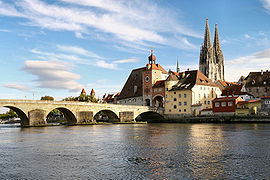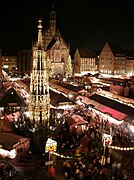Culture of Germany
This article needs to beupdated.(October 2018) |
Theculture of Germanyhas been shaped by major intellectual and popular currents in Europe, both religious and secular. German culture originated with theGermanic tribes,the earliest evidence of Germanic culture dates to theJastorf cultureinNorthern GermanyandDenmark.Contact with Germanic tribes were described by various Greco-Roman authors. The first extensive writing done on Germanic culture can be seen during the Roman Imperial Period withGermaniabyTacitus.
History
[edit]Germany has been the center for various important phenomena such as theMigration Period,theCarolingian Empire,Holy Roman Empire,theMedieval renaissances,Scholasticism,theHanseatic League,theGerman Renaissance,thePrinting Revolution,Protestant reformation,Prussia,Romanticism,Kaiserreich,WeimarandNational Socialism.
There are a number ofpublic holidays in Germany.The country is particularly known for itsOktoberfestcelebrations inMunich,itscarnival cultureand globally influentialChristmascustoms known asWeihnachten.[1][2]3 October has been thenational dayof Germany since 1990, celebrated as theGerman Unity Day(Tag der Deutschen Einheit). TheUNESCOinscribed 52 properties inGermany on the World Heritage List.[3]A global opinion poll for theBBCrevealed that Germany is recognized for having the most positive influence in the world in 2011, 2013, and 2014.[4][5][6]
Language
[edit]German is the official and predominant spoken language in Germany.[7]It is one of 23 official languages in the European Union, and one of the threeworking languagesof theEuropean Commission,along with English and French. Recognised native minority languages in Germany areDanish,Sorbian, North Frisianand Saterland Frisian,withLow Germanbeing a regional language. They are officially protected by theECRML.[8]The most used immigrant languages areTurkish,Kurdish,Polish,theBalkan languages,andRussian.
Standard German is aWest Germanic languageand is closely related to and classified alongside English, Dutch, and theFrisian languages.To a lesser extent, it is also related to theEast(extinct) andNorth Germanic languages.Most German vocabulary is derived from the Germanic branch of the Indo-European language family.[9]Significant minorities of words are derived fromLatinand Greek, with a smaller amount from French and most recently English (known asDenglisch). German is written using the Latin Alpha bet. In addition to the 26 standard letters, German has three vowels withUmlaut,namely ä, ö, and ü, as well as theEszettorscharfes S(sharp s) which is written "ß" (not used inSwitzerlandandLiechtenstein,where it is writtenssinstead). German orthography has gone through a series of reforms,the most recent in 1996.
Germandialectsare distinguished fromvarietiesofstandard German.[10]German dialects are traditional local varieties and can be traced back to the different German tribes. Many of them are not easily understandable to a speaker of standard German, since they often differ inlexicon,phonology,andsyntax.
Around the world, German has approximately 100 millionnative speakersand also about 80 million non-native speakers.[11]German is the main language of about 90 million people (18%) in the EU. 67% of German citizens claim to be able to communicate in at least one foreign language, 27% in at least two languages other than their first.[7]
In theGerman diaspora,aspects of German culture are passed on to younger generations throughnaming customsand through the use of spoken and written German. TheGoethe Instituteseeks to spread the knowledge of German culture worldwide. A total of 15.5 million people are currently learning German as a second language.[12]
Literature
[edit]German literature can be traced back to theMiddle Ages,with the most notable authors of the period beingWalther von der VogelweideandWolfram von Eschenbach. TheNibelungenlied,whose author remains unknown, is also an important work of the epoch, as is theThidrekssaga.The fairy tales collections collected and published byJacob and Wilhelm Grimmin the 19th century became famous throughout the world.
TheologianLuther,who translated the Bible into German, is widely credited for having set the basis for the modern "High German" language.
Among the most admired German philosophers and authors areLessing,Goethe,Schiller,Kleist,Hoffmann,Brecht,HeineandSchmidt.Nine Germans have won theNobel Prize in literature:Theodor Mommsen,Paul von Heyse,Gerhart Hauptmann,Thomas Mann,Nelly Sachs,Hermann Hesse,Heinrich Böll,Günter Grass,andHerta Müller.
| Johann Wolfgang v. Goethe (1749–1832) |
Friedrich Schiller (1759–1805) |
Brothers Grimm (1785–1863) |
Thomas Mann (1875–1955) |
Hermann Hesse (1877–1962) |
|---|---|---|---|---|
 |
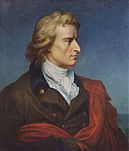 |
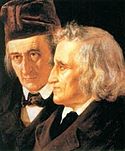 |
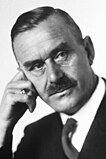 |
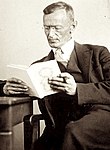
|
Philosophy
[edit]
The rise of the modern natural sciences and the related decline of religion raised a series of questions, which recur throughout German philosophy, concerning the relationships between knowledge and faith, reason and emotion, and scientific, ethical, and artistic ways of seeing the world.
German philosophershave helped shapewestern philosophyfrom as early as the Middle Ages (Albertus Magnus). Later,Leibniz(17th century) and most importantlyKantplayed central roles in thehistory of philosophy.Kantianisminspired the work ofSchopenhauerandNietzscheas well asGerman idealismdefended byFichteandHegel.MarxandEngelsdevelopedcommunist theoryin the second half of the 19th century whileHeideggerandGadamerpursued the tradition of German philosophy in the 20th century. A number of German intellectuals were also influential insociology,most notablyAdorno,Elias,Habermas,Horkheimer,Luhmann,Marcuse,Simmel,Tönnies,andWeber.TheUniversity of Berlinfounded in 1810 by linguist and philosopherWilhelm von Humboldtserved as an influential model for a number of modern western universities.
In the 21st century Germany has been an important country for the development of contemporaryanalytic philosophyin continental Europe, along with France, Austria, Switzerland and the Scandinavian countries.[13]
Music
[edit]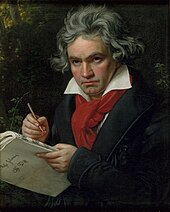
In the field of music, Germany claims some of the most renownedclassicalcomposers of the world, includingBach,MozartandBeethoven,who marked the transition between theClassicalandRomanticeras in Western classical music. Also, Germans developed manyLutheran choralesandhymns.
Other composers of theAustro-German tradition who achieved international fame includeBrahms,Wagner,Haydn,Johann Pachelbel,Schubert,Händel,Schumann,Mendelssohn Bartholdy,Johann Strauss II,Bruckner,Mahler,Telemann,Richard Strauss,Schoenberg,Orff,and most recently,Henze,Lachenmann,andStockhausen.
Germany is the largest music market in Europe, and third largest in the world.[14]It has exerted a strong influence onrockandheavy metal music.Artists such asHerbert Grönemeyer,Scorpions,Blind Guardian,Rammstein,Nena,Unheilig,Xavier Naidoo,Tokio HotelandModern Talkinghave enjoyed international fame.
German musicians have contributed heavily to developments inelectronic music,insynth-pop,electronic body music,tranceandhardcore.KrautrockbandKraftwerkare considered to be the pioneers ofsynth-pop,electro,[15]techno,[16]andhouse music.[17]Tangerine Dream's "Love on a Real Train"was a major influence on the development ofsynthwave.
German popular music of the 20th and 21st centuries includes the movements ofNeue Deutsche Welle(Nena,Alphaville),Ostrock(City,Keimzeit),metal/rock,punk(Nina Hagen,Böhse Onkelz,Die Ärzte,Die Toten Hosen),pop rock(Beatsteaks),indie(Tocotronic,Blumfeld) andhip hop(Die Fantastischen Vier,Deichkind). A global trendsetter is the German techno andminimalscene (e.g.Ricardo Villalobos,Paul KalkbrennerandSven Väth).
Germany hosts many large rockmusic festivalsevery year. TheRock am Ringfestival is the largest music festival in Germany, and among the largest in the world. German artists also make up a large percentage ofindustrialandNeue Deutsche Härteacts. Germany hosts some of the largestgothordark culturescenes and festivals in the entire world, with events likeWave-Gotik-TreffenandM'era Luna Festivalattracting up to 30,000 people. In addition, the country hostsWacken Open Air,the biggest heavy metal open air festival in the world.
Since about 1970, Germany has once again had a thriving popular culture, now increasingly led by its reinstated capitalBerlin,and a self-confident music and art scene. Germany is also very well known for its many renownedopera houses,such asSemperoper,Komische Oper BerlinandMunich State Theatre.Richard Wagner established theBayreuth Festspielhaus.
One of the most famous composers of the international film business isHans Zimmer.The year 2020 was designated “Beethoven Year” to mark 250 years since the composer was born.[18]
Cinema
[edit]German cinema dates back to the very early years of the medium with the work ofMax Skladanowsky.It was particularly influential during the years of the Weimar Republic withGerman expressionistssuch asRobert WieneandFriedrich Wilhelm Murnau.Austrian-based directorFritz Lang,who became a German citizen in 1926 and whose career flourished in the pre-war German film industry, is said to have been a major influence on Hollywood cinema. His silent movieMetropolis(1927) is referred to as the birth of modern Science Fiction movies. Founded in 1912, theBabelsberg Film Studiois the oldest large-scale film studio in the world.
In 1930,Josef von SternbergdirectedThe Blue Angel,which was the first major Germansound filmand it brought world fame to actressMarlene Dietrich.[19]Impressionist documentaryBerlin: Symphony of a Great City,directed byWalter Ruttmann,is a prominent example of the city symphony genre. TheNazi eraproduced mostly propaganda films although the work ofLeni Riefenstahlstill introduced new aesthetics to film.[20]
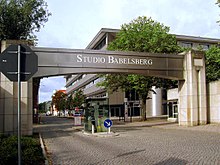
During the 1970s and 1980s,New German Cinemadirectors such asVolker Schlöndorff,Werner Herzog,Wim Wenders,andRainer Werner Fassbinderput West German cinema back on the international stage with their often provocative films.[21]
More recently, films such asGood Bye Lenin!(2003),Gegen die Wand (Head-on)(2004),Der Untergang (Downfall)(2004), andDer Baader Meinhof Komplex(2008) have enjoyed international success.
TheAcademy Award for Best Foreign Language Filmwent to the German productionDie Blechtrommel (The Tin Drum)in 1979, toNowhere in Africain 2002, and toDas Leben der Anderen (The Lives of Others)in 2007.[22]Among the most famous German actors are Marlene Dietrich,Klaus Kinski,Hanna Schygulla,Armin Mueller-Stahl,Jürgen Prochnow,Thomas Kretschmann,Til SchweigerandDaniel Brühl.
TheBerlin Film Festival,held annually since 1951, is one of the world's foremost film festivals. An international jury places emphasis on representing films from all over the world and awards the winners with the Golden and Silver Bears.[23]The annualEuropean Film Awardsceremony is held every second year in the city of Berlin, where theEuropean Film Academy(EFA) is located. TheBabelsberg Studiosin Potsdam are the oldest large-scale film studios in the world and a centre for international film production.
Media
[edit]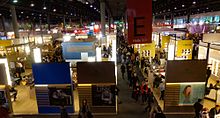
Germany's television market is the largest in Europe, with 34,000,000 TV households. The many regional and national public broadcasters are organised in line with the federal political structure. Around 90% of German households have cable or satellite TV, and viewers can choose from a variety of free-to-view public and commercial channels. Pay-TV services have not become popular or successful while public TV broadcastersZDFandARDoffer a range of digital-only channels.[24]Reality TVis the most popular programming in Germany and a key part in modern German culture.
Germany is home to some of the world's largest media conglomerates, includingBertelsmann,theAxel Springer AGandProSiebenSat.1 Media.
The German-speaking book publishers produce about 700,000,000 copies of books every year, with about 80,000 titles, nearly 60,000 of them new publications. Germany is in third place on international statistics after the English-speaking book market and the People's Republic of China.[25]TheFrankfurt Book Fairis considered to be the most important book fair in the world for international deals and trading and has a tradition that spans over 500 years.
Many of Europe's best-sellingnewspapersandmagazinesare produced in Germany. The papers with the highest circulation areDie Zeit,Süddeutsche Zeitung,Frankfurter Allgemeine ZeitungandDie Welt,the largest magazines includeDer Spiegel,SternandFocus.TheBildis atabloidand has the largest circulation of all German papers.[26]
However, the publishing industry is in flux – amongst other things because meanwhile almost 800,000 newspaper copies sold daily are distributed digitally and the number of digital subscriptions is continually rising. Nevertheless, a total of around 38 million people in Germany still read a printed newspaper every day, while around 14.6 million make use of newspapers’ digital offerings.[27]
Architecture
[edit]
Architecturalcontributions from Germany include theCarolingianandOttonian styles,important precursors ofRomanesque.The region[clarification needed]has also produced significant works in styles such as theGothic,RenaissanceandBaroque.
The nation was particularly important in the earlymodern movementthrough theDeutscher Werkbundand theBauhausmovement identified withWalter Gropius.TheNazisclosed these movements and favoured a type ofneo-classicism.SinceWorld War IIpost-modern structures have been built. Since the reunification of Germany the trend has continued.
Art
[edit]
German art has a long and distinguished tradition in thevisual arts,from the earliest known work of figurative art to its current output ofcontemporary art.
Important GermanRenaissancepainters includeAlbrecht Altdorfer,Lucas Cranach the Elder,Matthias Grünewald,Hans Holbein the Youngerand the well-knownAlbrecht Dürer.The most importantBaroqueartists from Germany areCosmas Damian Asam.Further artists are the painterAnselm Kiefer,romanticCaspar David Friedrich,thesurrealistMax Ernst,theconceptualistJoseph Beuys,orWolf Vostellor theneo-expressionistGeorg Baselitz.
Within modern day society, contemporary art is a large aspect of the culture. This large community draws in people from all around the world. There are around 500 galleries in Germany that caters to this modern form of art.[28]Art Cologneis a popular fair that displays contemporary art.
Religion
[edit]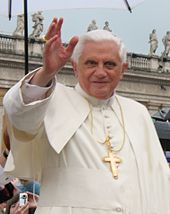
Christianity was introduced to the area of modern Germany by 300 AD and became fullyChristianizedby the time ofCharlemagnein the eighth and ninth century. After theReformationstarted byMartin Lutherin the early 16th century, many people left theCatholic Churchand becameProtestant,mainlyLutheranandCalvinist.[29]59.4% of the German population belongs to Christian denominations: 30% areRoman Catholic,and 29% are affiliated withProtestantism[30](the figures are known accurately because Germany imposes achurch taxon those who disclose a religious affiliation).

The north and east are predominantly Protestant, the south and west predominantly Catholic. Nowadays there is a non-religious majority in Hamburg and the former East German states.[31]Germany was, at one point, almost in its entirety within the Roman CatholicHoly Roman Empire,but was also the source ofProtestant reformerssuch asMartin Luther.During theKulturkampf(from about 1872 to 1886) the government opposed the Catholic church.
Historically, Germany had a substantialJewish population.[32]Only a few thousand people of Jewish origin remained in Germany afterthe Holocaust,but the German Jewish community now has about 100,000 members,[33]many from the formerSoviet Union.Germany also has a substantialMuslimpopulation, most of whom are descendants ofTurkishworkers fromTurkey.
German theologians includeLuther,Melanchthon,Schleiermacher,Feuerbach,andRudolf Otto.Germany was also the origin of manymystics,includingMeister Eckhart,Rudolf Steiner,andJakob Boehme;and of PopeBenedict XVI.
Science
[edit]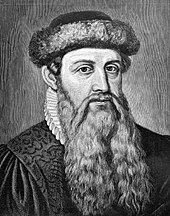
Germany has been the home of many famousinventorsandengineers,such asJohannes Gutenberg,who is credited with the invention ofmovable typeprintingin Europe;Hans Geiger,the creator of theGeiger counter;andKonrad Zuse,who built the first computer.[34]German inventors, engineers and industrialists such asZeppelin,Daimler,Diesel,Otto,Wankel,von BraunandBenzhelped shape modern automotive and air transportation technology including the beginnings of space travel.[35][36]
The work ofAlbert EinsteinandMax Planckwas crucial to the foundation of modernphysics,whichWerner HeisenbergandErwin Schrödingerdeveloped further.[37]They were preceded by such key physicists asHermann von Helmholtz,Joseph von Fraunhofer,andGabriel Daniel Fahrenheit,among others.Wilhelm Conrad RöntgendiscoveredX-rays,an accomplishment that earned him the firstNobel Prize in Physicsin 1901.[38]TheWalhalla templefor "laudable and distinguished Germans" features a number of scientists, and is located east ofRegensburg,inBavaria.[39][40]
Germany is home to some of the finest academic centers in Europe. Some famous universities are those of Munich and Berlin,University of Tübingen,University of Göttingen,University of Marburg,University of Berlin,Mining Academy FreibergandFreiburg University,among many others. Moreover, theRuprecht-Karls-Universität Heidelbergis one of the oldest universities in Europe.
Fashion and design
[edit]
German designers were leaders of modernproduct design,with theBauhausdesigners likeMies van der Rohe,andDieter RamsofBraunbeing essential.[41]
Germany is a leading country in thefashion industry.The German textile industry consisted of about 1,300 companies with more than 130,000 employees in 2010, which generated a revenue of 28 billion Euro. Almost 44 percent of the products are exported. The textile branch thus is the second largest producer of consumer goods after food production in the country.[42]Berlin is the center of young and creative fashion in Germany, prominently displayed atBerlin Fashion Week(twice a year). It also hosts Europe's largest fashion trade fair calledBread & Butter.
Munich, Hamburg and Düsseldorf are also important design and production hubs of the German fashion industry, among smaller towns.[43]Renowned fashion designers from Germany includeKarl Lagerfeld,Jil Sander,Wolfgang Joop,Philipp PleinandMichael Michalsky.Important brands includeHugo Boss,EscadaandTriumph,as well as special outfitters likeAdidas,PUMAandJack Wolfskin.The GermansupermodelsClaudia Schiffer,Heidi Klum,Tatjana PatitzandNadja Auermanncame to global fame.[44]
Cuisine
[edit]
German cuisine varies from region to region. The southern regions ofBavariaand Swabia, for instance, share a culinary culture with Switzerland and Austria. Pork, beef, and poultry are the main varieties of meat consumed in Germany; pork is the most popular.[45]Throughout all regions, meat is often eaten insausageform. More than 1,500 different types of sausage are produced in Germany.Organic foodhas gained a market share of almost 6%, and this is predicted to increase further.[46]
A popular German saying has the meaning: "Breakfast like an emperor, lunch like a king, and dine like a beggar." Breakfast is usually a selection of breads and rolls with jam and honey or cold cuts and cheese, sometimes accompanied by a boiled egg.Cerealsor muesli with milk or yoghurt is less common but widespread.[47]More than 3000 types ofbreadare sold in bakery shops across the country.[48]Occasionally, more traditional and heartier Breakfasts, like the Bavarian "Brotzeit" withWeisswurst,Sweet Mustard andWheat beer,or theBauernfrühstückare also popular.
It is customary for Germans to have a very large lunch around noon. A typical lunch usually consists of some type of meat or fish, a heavy carb such as potato orGerman noodles,and a side of vegetables. Due to the increasing number of Germans who work in urban centers, however, many more people are eating simple items on-the-go for lunch such asCurrywurstorSchnitzel.Currywurstis a go-to quick meal to pick up that consists of small pieces of sausage, french fries, and a spicy ketchup sauce.Schnitzelis cooked at home as well as picked up on-the-go and consists of meat covered in egg, flour andbreadcrumbs.[49]
The term for dinner in German is Abendbrot which directly translates to "evening bread". As the name suggests, typically Germans will have a lighter dinner that consists of sliced meat, sausages, bread, and cheeses. Also, most dinners eaten by Germans usually include some form ofmustardand pickles.[50]The habit of having a simple, light dinner has become less of an everyday routine for many Germans. Due to the increasing number of people who work all day, it is difficult for many Germans to make the time to have a large lunch. For this reason, larger dinners have become more common. Although, most families still have Abendbrot at least a few times a week.[51]
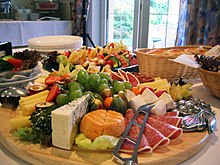
As a country with many immigrants, Germany has adopted many international dishes into its cuisine and daily eating habits.Italiandishes likepizzaandpasta,TurkishandArabdishes likedöner kebabandfalafel,are well established, especially in bigger cities. Internationalburgerchains, as well asChineseandGreekrestaurants, are widespread.Indian,Thai,Japanese,and other Asian cuisines have gained popularity in recent decades. Among high-profile restaurants in Germany, theMichelin guidehas awarded ten restaurants three stars, the highest designation, while 38 more received two stars and 255 one star.[52]German restaurants have become the world's second most decorated eateries after France.[53]
AlthoughGerman wineis becoming more popular in many parts of Germany, the national alcoholic drink isbeer.In over 1.500 breweries more than 5.000 types of beer are produced.[54]German beer consumption per person is declining but—at 116 litres annually—it is still among the highest in the world.[55]Beer varieties includeAlt,Bock,Dunkel,Kölsch,Lager,Malzbier,Pils,andWeizenbier.Among 18 surveyed western countries, Germany ranked 14th in the list of per capita consumption of soft drinks in general, while it ranked third in the consumption of fruit juices.[56]Furthermore, carbonated mineral water andSchorle(its mixture with fruit juice or wine) are very popular in Germany.
Gaming
[edit]Germany is filled with inventors of board games, also known asEurogames,that are played around the world. Popular games includeThe Settlers of Catan,which features hexagonal resource tiles that generate resources according to the roll of two dice, andCarcassonnewith its randomly drawn square tiles that eventually make a medieval map and its notability for itsmeeples.The fervor for new games continued withPuerto Rico,Ticket to Ride,andAlhambra.In 2008, Germany imported the popular card gameDominionfrom the US. Today, Germany publishes more board games than any other country per capita.[57]
TheGerman video gaming marketis one of the largest in the world.[58]TheGamescomin Cologne is the world's leading gaming convention.[59]Popular game series from Germany includeTurrican,theAnnoseries,The Settlersseries,theGothicseries,SpellForce,theXseries,theFIFA Managerseries,Far CryandCrysis.The most relevant game developers and publishers areBlue Byte,Crytek,Deck13,Deep Silver,Daedalic Entertainment,Egosoft,Kalypso Media,Koch Media,Piranha Bytes,Related DesignsandYager Development.Bigpoint,Gameforge,Goodgame,Quake III Arena / Defrag andWoogaare leading developers of online andsocial games.[60]
Sports
[edit]
Sport forms an integral part of German life. 27,000,000 Germans are members of a sports club and an additional 12,000,000 pursue such an activity individually.[61]Association footballis the most popular sport. With more than 6,300,000 official members, theGerman Football Association(Deutscher Fußball-Bund) is the largest sports organisation of its kind worldwide.[61]TheBundesligaattracts the second-highestaverage attendanceof any professional sports league in the world. TheGermany national football teamwon theFIFA World Cupin 1954, 1974, 1990 and 2014 and theUEFA European Football Championshipin 1972, 1980 and 1996. Germany has hosted the FIFA World Cup in1974and2006and theUEFA European Football Championshipin1988.Amongst the most successful and renowned footballers are:Franz Beckenbauer,Gerd Müller,Jürgen Klinsmann,Lothar Matthäus,andOliver Kahn.Other popular spectator sports includehandball,volleyball,basketball,ice hockey,andtennis.[61]
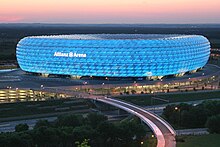
Germany is one of the leading motorsports countries in the world. Race-winning cars, teams and drivers have come from Germany. One of the most successfulFormula Onedrivers in history,Michael Schumacher,set many significant motorsport records during his career, winning sevenFormula One World Drivers' Championshipsand 91 Formula One race wins, making him the most gilded driver since Formula One's debut season in 1950. He is one of the highest paid sportsmen in history and became a billionaire athlete.[62]Sebastian Vettel,another German Formula One pilot, later became the youngest Formula One World Champion in history and went on to win four consecutive world championship titles. He still holds records forthe highest number of consecutive race winsandmost pole positions in a single season.Constructors likeBMWandMercedesare among the leading manufacturers in motorsport. Additionally,Porschehas won the24 Hours of Le Mans,a prestigious annual endurance race held in France, 16 times, andAudihas won it 9 times. TheDeutsche Tourenwagen Mastersis a popular series in Germany.
Historically, German sportsmen have been some of the most successful contenders in theOlympic Games,ranking third in anall-time Olympic Games medal count,combining East and West German medals. In the2016 Summer Olympics,Germany finished fifth in the medal count,[63]while in the2018 Winter Olympicsthey finished second.[64]Germany has hosted theSummer Olympic Gamestwice, in Berlin in1936and inMunichin1972.TheWinter Olympic Gamestook place in Germany once in1936when they were staged in theBavariantwin towns ofGarmischandPartenkirchen.
Society
[edit]
Germany is a modern, advanced society, shaped by a plurality of lifestyles and regional identities.[65]The country has established a high level ofgender equality,promotesdisability rights,and is legally and socially tolerant towards homosexuals. Gays and lesbians can legally adopt their partner's biological children, andsame-sex marriagehas been permitted since 2017.[66]The former Foreign ministerGuido Westerwelleand the former mayor of Berlin,Klaus Wowereit,are openly gay.[67]
During the last decade of the twentieth century, Germany's attitude towards immigrants changed. Until the mid-1990s, the opinion was widespread that Germany was not a country of immigration, even though about 20% of the population were of non-German origin. Today the government and a majority of the German society are acknowledging that immigrants from diverse ethnocultural backgrounds are part of German society and that controlled immigration should be initiated based on qualification standards.[68]
Since the2006 FIFA World Cup,the internal and external evaluation of Germany's national image has changed.[69]In the annualNation Brands Indexglobal survey, Germany became significantly and repeatedly more highly ranked after the tournament. People in 20 different states assessed the country's reputation in terms of culture, politics, exports, its people and its attractiveness to tourists, immigrants and investments. Germany has been named the world's second most valued nation among 50 countries in 2010.[70]Another global opinion poll, for theBBC,revealed that Germany is recognised for the most positive influence in the world in 2010. A majority of 59% have a positive view of the country, while 14% have a negative view.[71][72]
With an expenditure of €67 billion on international travel in 2008, Germans spent more money on travel than any other country. The most visited destinations wereSpain,ItalyandAustria.[73]Additionally, tourism analysts estimate that over 65 percent of Germans vacationed for 5 or more days in 2007.[74]The large amount of travel that Germans partake in can also be attributed to the amount of vacation days they receive. In Germany, employees are given a minimum of 24 vacation days annually, but often employers will give between 25 and 30 paid vacation days.[75]Germans also like packaged vacations which can be all-inclusive vacations or pre-booked excursions or reservations. In 2018, 43% of all German travel consisted of packaged vacations.[76]
Leisure
[edit]In Germany, leisure is considered a quintessential part of the culture. Researchers inHamburgconcluded that Germans over 14 years old have an average of 4 hours of leisure time per day. Regardless of many factors that differentiate Germans, across the board, the most popular leisure activity is watching television.[77]Most Germans dedicate their Sundays to leisure activity because a majority of shops and restaurants are closed on Sundays.
Sports clubsare a large part of Germans' leisure time. Currently, around 26 million people in Germany make up the membership to the over 91,000 sports clubs in Germany. Sports clubs can aid children and adults in getting to know people in their community through a shared passion for sports.[78]
Another leisure activity that Germans like to partake in isexercise.Studies show that most Germans work out at least once a week in their free time.[79]
Gallery
[edit]-
Old Town ofRegensburg(UNESCOWorld Heritage Site)
-
TheOktoberfestinMunichis the world's largest fair.
See also
[edit]- German Forest
- Goethe-Institut
- Prussian virtues
- Public holidays in Germany
- German folklore
- Weihnachten
- Oktoberfest
- List of museums in Germany
References
[edit]- ^MacGregor, Neil (28 September 2014)."The country with one people and 1,200 sausages".BBC.Retrieved11 December2014.
- ^"Christmas Traditions in Austria, Germany, Switzerland".German Ways.Retrieved12 December2014.
- ^"World Heritage Sites in Germany".UNESCO. Archived fromthe originalon 12 May 2010.Retrieved3 October2010.
- ^"Views of US Continue to Improve in 2011 BBC Country Rating Poll".Worldpublicopinion.org.7 March 2011.Retrieved28 March2011.[dead link]
- ^"BBC poll: Germany most popular country in the world".BBC. 23 May 2013.Retrieved28 March2011.
- ^"World Service Global Poll: Negative views of Russia on the rise".BBC.co.uk.4 June 2014.Retrieved15 July2014.
- ^abEuropean Commission(2006)."Special Eurobarometer 243: Europeans and their Languages (Survey)"(PDF).Europa (web portal).Retrieved3 February2007.
European Commission(2006)."Special Eurobarometer 243: Europeans and their Languages (Executive Summary)"(PDF).Europa (web portal).Retrieved3 February2007. - ^"Full list".Treaty Office.Retrieved8 October2020.
- ^European Commission(2004)."Many tongues, one family. Languages in the European Union"(PDF).Europa (web portal).Retrieved3 February2007.
- ^"Germany - Languages".Encyclopedia Britannica.Retrieved8 October2020.
- ^National Geographic Collegiate Atlas of the World.Willard, Ohio: R.R Donnelley & Sons Company. April 2006. pp. 257–270.ISBN978-0-7922-3662-7.
- ^"Attractive Language".
- ^Searle, John. (1987).The Blackwell Companion to Philosophy,"Introduction". Wiley-Blackwell.
- ^"Bundesverband Musikindustrie: Deutschland drittgrößter Musikmarkt weltweit".Musikindustrie.de. 13 April 2011. Archived fromthe originalon 31 December 2011.Retrieved28 February2012.
- ^"Electro Music Genre Overview".AllMusic.Retrieved26 November2022.
- ^"How Kraftwerk pioneered electronic music without computers – DW – 08/25/2017".dw.Retrieved26 November2022.
- ^"Why Kraftwerk are still the world's most influential band".the Guardian.27 January 2013.Retrieved26 November2022.
- ^"Beacons and defining influences".Facts about Germany.Retrieved27 May2021.
- ^Bordwell, David;Kristin Thompson (2003) [1994]. "The Introduction of Sound".Film History: An Introduction(2nd ed.). New York City: McGraw-Hill. p. 204.ISBN978-0-07-115141-2.
- ^Leni Riefenstahl,Filmbug Movie Stars. Retrieved 13 April 2007.
- ^Rainer Werner FassbinderArchived26 October 2011 at theWayback Machine,Fassbinder Foundation. Retrieved 13 April 2007.
- ^Awards:Das Leben der Anderen,IMDb. Retrieved 13 April 2007.
- ^2006 FIAPF accredited Festivals DirectoryArchived9 January 2007 at theWayback Machine,International Federation of Film Producers Associations, retrieved on 11 December 2006.
- ^Country profile: Germany,BBC News. Retrieved 7 December 2007.
- ^Germany – Land of ideasArchived29 June 2007 atarchive.today,land-der-ideen.de Retrieved 12 December 2010.
- ^"ZDB OPAC - start/text".d-nb.de.Archived fromthe originalon 14 July 2006.Retrieved1 April2015.
- ^"Newspapers and magazines".Facts about Germany.Retrieved27 May2021.
- ^Hintereder, Peter (2015).Facts About Germany.Frankfurter Societäs-Medien GmbH, Frankfurt am Main, in-cooperation with the German Federal Foreign Office, Berlin. p. 145.ISBN978-3-95542-169-4.
- ^Minahan, James (2000). "Germans".One Europe, Many Nations: A Historical Dictionary of European National Groups.Greenwood Publishing Group.pp. 287–294.ISBN0313309841.
- ^EKD: Evangelische Kirche in Deutschland - Christen in Deutschland 2005Archived30 April 2011 at theWayback Machine
- ^http:// ekd.de/download/kimi_2004.pdfpage 7
- ^"Germany: Virtual Jewish History Tour".Jewish Virtual Library.Retrieved22 February2013.
- ^"Religionszugehörigkeit Bevölkerung Deutschland"(PDF)(in German). Forschungsgruppe Weltanschauungen in Deutschland. Archived fromthe original(PDF)on 15 January 2016.Retrieved24 January2016.
- ^Horst, Zuse.The Life and Work of Konrad ZuseEveryday Practical Electronics (EPE) Online. Retrieved 2007-01-02
- ^Automobile.Archived29 October 2009 at theWayback MachineMicrosoft Encarta Online Encyclopedia 2006. Retrieved 2007-01-02
- ^The ZeppelinArchived1 May 2011 at theWayback MachineU.S. Centennial of Flight Commission. Retrieved 2007-01-02
- ^Roberts, J. M.The New Penguin History of the World,Penguin History, 2002. Pg. 1014.ISBN0-14-100723-0
- ^The Alfred B. Nobel Prize Winners, 1901-2003Archived10 February 2010 at theWayback MachineHistory Channel fromThe World Almanac and Book of Facts2006. Retrieved 2007-01-02
- ^Walhalla Ruhmes- und Ehrenhalle(in German), archived fromthe originalon 2 October 2007,retrieved3 October2007
- ^Walhalla, official guide booklet. p. 3. Translated by Helen Stellner and David Hiley, Bernhard Bosse Verlag Regensburg, 2002
- ^"Bauhaus: The Single Most Influential School of Design".gizmodo. 13 June 2012.Retrieved9 December2014.
- ^"BMWI Branchenfokus Textil und Bekleidung".Archived fromthe originalon 21 July 2012.Retrieved28 September2014.
- ^"Die deutsche Mode kommt aus der Provinz".BRIGITTE.Retrieved28 September2014.
- ^"German Cultures Today: Fashion Stars - One Germany in Europe".German History Docs GHDI.Retrieved26 April2015.
- ^"German food stats".nationmaster.Retrieved26 November2007.
- ^"Organic Agriculture in Germany".organic-Europe. Archived fromthe originalon 22 November 2007.Retrieved26 November2007.
- ^Eating the German wayArchived1 October 2006 at theWayback Machine,Cultural Profiles Project. Retrieved 2007, 26 November.
- ^"Zahlen und Fakten zu Brot · Brotinstitut · Deutsches Brotinstitut e.V."
- ^"Schnitzel Recipe".NYT Cooking.Retrieved27 March2021.
- ^"How to Eat Like a German".german-way.Retrieved24 February2021.
- ^"Breakfast, Lunch, Dinner… and lots of Snacks – Germanfoods.org".Retrieved24 February2021.
- ^Schnitzel Outcooks Spaghetti in Michelin Guide,Deutsche Welle. Retrieved 2007, 26 November.
- ^German cuisine beats Italy, Spain in gourmet starsArchived10 January 2009 at theWayback Machine,Reuters India. Retrieved 2007, 26 November.
- ^"Brauereien in Deutschland bis 2020".
- ^Europe's largest beer marketArchived7 November 2011 at theWayback Machine,royalunibrew. Retrieved 2007, 26 November.
- ^Soft drink consumption,nationmaster. Retrieved 2007, 26 November.
- ^Curry, Andrew (23 March 2009)."Monopoly Killer: Perfect German Board Game Redefines Genre".archive.wired.Archived fromthe originalon 10 May 2015.Retrieved27 May2015.
- ^Purchese, Robert (17 August 2009)."Germany's video game market".Eurogamer.net.Retrieved4 March2012.
- ^"Press releases".gamescom Press Center. 2014. Archived fromthe originalon 10 February 2015.Retrieved26 March2015.
- ^"Made in Germany: The most important games from Germany (German)".PC GamesHardware. 27 November 2011.Retrieved9 December2014.
- ^abc"Germany Info: Culture & Life: Sports".Germany Embassy in Washington, D.C. Archived fromthe originalon 30 April 2011.Retrieved28 December2006.
- ^Ornstein, David (23 October 2006)."What we will miss about Michael Schumacher".The Guardian.London.Retrieved19 October2007.
- ^"Medals By Countries".Rio2016.Rio 2016 Organising Committee for the Olympic and Paralympic Games.Archived fromthe originalon 18 August 2016.Retrieved20 August2016.
- ^"Medal Standings".Pyeongchang 2018.Archived fromthe originalon 24 February 2018.Retrieved24 February2018.
- ^SocietyArchived20 May 2011 at theWayback MachineThe German Mission to the United States. Retrieved 16 October 2010.
- ^[1]bbc. Retrieved 28 April 2019.Archived12 July 2009 at theWayback Machine.
- ^Weinthal, Benjamin (31 August 2006)."He's Gay, and That's Okay".Gay City News.New York.Retrieved3 September2009.[dead link]
- ^Heckmann, Friedrich (2003).The Integration of Immigrants in European Societies: national differences and trends of convergence (Warning Germany Has No Humor).Stuttgart: Lucius & Lucius. pp. 51 ff.ISBN978-3-8282-0181-1.Retrieved28 October2010.
- ^How Germany won the World Cup of Nation BrandingArchived14 May 2008 at theWayback Machine.BrandOvation. Retrieved 25 November 2007.
- ^"2010 Anholt-GfK Roper Nation Brands Index"(Press release).GfK.12 October 2010. Archived fromthe originalon 16 October 2010.Retrieved15 October2010.
- ^"World warming to US under Obama, BBC poll suggests".BBC News Online.London. 19 April 2010.Retrieved28 October2010.
- ^BBC World Service Poll.BBC News. Retrieved 19 April 2010.
- ^"Germans spend most on foreign trips: Industry group".The Economic Times.New Delhi. 10 March 2009.Retrieved15 March2009.
- ^Wozny, Peter."In Germany, Leisure Is an Active Pursuit | DW | 05.02.2009".DW.COM.Retrieved24 February2021.
- ^"How To Germany - Employees' Rights in Germany".howtogermany.Retrieved1 March2021.
- ^Kraus, Nils."Travel Behavior – Germans Prefer Security |.TR".tourism-review.Retrieved1 March2021.
- ^Deutschland, Alumniportal."Leisure activities in Germany - television is the Germans' best friend".alumniportal-deutschland.org.Retrieved24 February2021.
- ^Deutschland, Alumniportal."Sports clubs in Germany – working for youth and integration".alumniportal-deutschland.org.Retrieved24 February2021.
- ^Wozny, Peter."In Germany, Leisure Is an Active Pursuit".DW.COM.Retrieved24 February2021.






